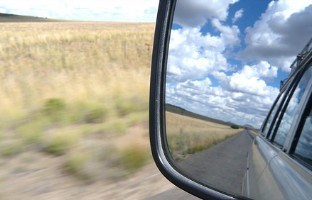Road trips: What memories are for
One day in January, my son Jacob and his college roommate Ben were busy packing our family's 11-year-old Subaru wagon. One of their professors had approved their independent project for January term credit. Loosely put, the project was to involve extensive car travel out West to meet and interview creative people for video clips. I read through their proposal; it sounded a bit like Charles Kuralt, only more amateurish—and based on a $500 budget.
Where would they go? Who would they interview? All that I could tell from some penciled-out destinations was that this 21-year-old Lewis and 23-year-old Clark hoped to meet their interviewees near ski resorts. Did I say that snowboards were strapped to the top of the car?
As with most trips, half the fun is the anticipation and the preparation—that's when dreams are launched and tales imagined. The homemade wooden shelf in the Subaru would allow these two partially shaven men to sleep in the car beneath their luggage. (I remember the text they sent from North Platte, Nebraska, on their first night: it was four degrees above zero.)





